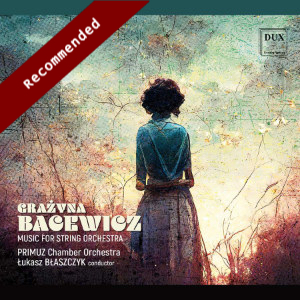
Grażyna Bacewicz (1909-1969)
Music for string orchestra
Concerto for string orchestra (1948)
Symphony for string orchestra (1946)
Sinfonietta for string orchestra (1935)
Divertimento for string orchestra (1965)
Primuz Chamber Orchestra/Łukasz Błaszczyk
rec. 2021, Concert Hall, Grazyna and Kiejstut Concert Hall, Łódź, Poland
DUX 1793 [55]
It does seem as if the Polish composer Grażyna Bacewicz’s time has come at last. There are now competing versions of a number of her works and a cycle of her symphonies has recently started. I have enjoyed everything of hers I have heard so far, and this new disc is no exception. This is a group of works for string orchestra, all of which show her vivid imagination, expressive melodic writing and pungent rhythms. Her idiom is broadly neoclassical (she had been a pupil of Nadia Boulanger), though she has something of her own to contribute. She clearly listened to mid-period Stravinsky, Bartók and Martinů, and if you enjoy those composers you will enjoy Bacewicz.
The Concerto is in three movements, fast, slow and fast, and none of them long. The driving rhythms and jagged themes of the opening suggest a modern version of a Brandenburg concerto, though the gentle, questioning second theme strikes a different note. The slow movement spins a continuous and eloquent melodic line with rich harmonies and a serene ending. The finale features a leaping and dancing main theme and a similar vigour to the opening.
The Symphony is in four movements and offers a nod to the early classical style, with a sense of a concerto grosso reaching forward – think C. P. E. Bach perhaps. The opening is again vigorous with a kind of development section. The slow second movement is a highly chromatic lament which builds to an impassioned climax. The third movement is neither a minuet nor a scherzo but a gentle piece offering relief and contrast to both the preceding movements. The finale dances, but with many twists and turns, full of that astringent wit which is such a feature of Bacewicz’s writing.
The Sinfonietta is an earlier work, more similar to the Concerto. Again, it is in three movement, and the influence of Bartok is more evident in the outer movements, but the middle Andante is closer to expressionism, even occasionally sounding like Berg.
The Divertimento which ends the disc is a late work, in three very short and terse movements. It is a kind of distillation of what she had to say in the string orchestra field, with a slightly higher level of dissonance than its predecessors. It lasts less than seven minutes but is a complete and satisfying work.
The Primuz Chamber Orchestra was founded by its conductor Łukasz Błaszczyk in 2012 and Bacewicz’s Concerto was the first work in their inaugural concert. They play with verve and imagination and seem thoroughly at home in her world. The recording is excellent and the sleevenotes, in Polish and English, are helpful.
There are other recordings of these works, including one of this identical programme on another Dux disc from 2022 (DUX 1828), which I have not heard. However, I think this one would be hard to beat. Bacewicz is well worth hearing.
Stephen Barber
Help us financially by purchasing from





















